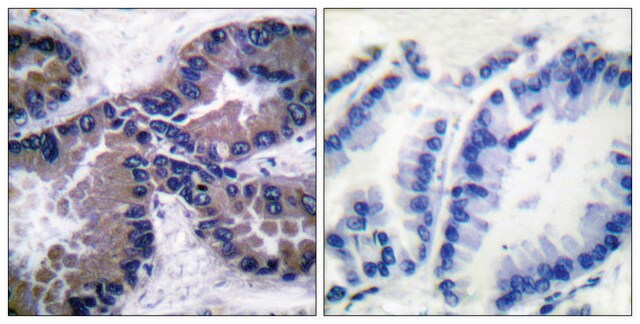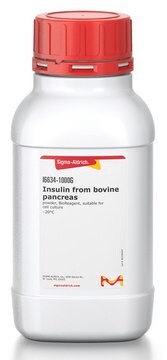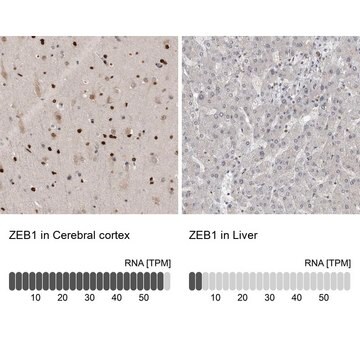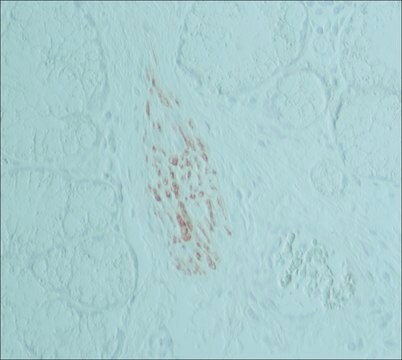E1523
Anti-ERK5 (big-MAPK, BMK1) antibody produced in rabbit
IgG fraction of antiserum, buffered aqueous solution
Sign Into View Organizational & Contract Pricing
All Photos(1)
About This Item
Recommended Products
biological source
rabbit
Quality Level
conjugate
unconjugated
antibody form
IgG fraction of antiserum
antibody product type
primary antibodies
clone
polyclonal
form
buffered aqueous solution
mol wt
antigen 97 kDa
species reactivity
mouse, human
technique(s)
microarray: suitable
western blot: 1:8,000 using NIH 3T3 mouse fibroblasts cell extract
UniProt accession no.
shipped in
dry ice
storage temp.
−20°C
target post-translational modification
unmodified
Gene Information
human ... MAPK7(5598)
mouse ... Mapk7(23939)
General description
Extracellular signal-regulated kinase 5 (ERK5), also referred to as big-MAP kinase 1 (BMK1), is a protein that belongs to mitogen-activated protein kinases family and is expressed mainly in skeletal muscle, kidney, heart and placenta. ERK5 contains a distinct 400-amino acid C-terminal and loop-12 domain, which includes two proline-rich regions.
Immunogen
synthetic peptide corresponding to amino acids 789-802 of human ERK5.
Application
Anti-ERK5 (big-MAPK, BMK1) an0tibody produced in rabbit has been used in immunoblotting.
Biochem/physiol Actions
Extracellular signal-regulated kinase 5 (ERK5) has a critical role in different cellular processes like differentiation, proliferation and survival. Anti-ERK5 (big-MAPK, BMK1) antibody can be used to study the differential tissue expression and intracellular localization of the MAP Kinase isoform in normal and neoplastic tissues.
Physical form
Solution in 0.01 M phosphate buffered saline, pH 7.4, containing 15 mM sodium azide.
Disclaimer
Unless otherwise stated in our catalog or other company documentation accompanying the product(s), our products are intended for research use only and are not to be used for any other purpose, which includes but is not limited to, unauthorized commercial uses, in vitro diagnostic uses, ex vivo or in vivo therapeutic uses or any type of consumption or application to humans or animals.
Not finding the right product?
Try our Product Selector Tool.
Storage Class
10 - Combustible liquids
wgk_germany
WGK 3
flash_point_f
Not applicable
flash_point_c
Not applicable
Choose from one of the most recent versions:
Already Own This Product?
Find documentation for the products that you have recently purchased in the Document Library.
The role of ERK1, 2, and 5 in dopamine neuron survival during aging
Parmar MS, et al.
Neurobiology of Aging, 35(3), 669-679 (2014)
Extracellular signal-regulated kinase 7 (ERK7), a novel ERK with a C-terminal domain that regulates its activity, its cellular localization, and cell growth
Abe MK, et al.
Molecular and Cellular Biology, 19(2), 1301-1312 (1999)
An evolutionarily conserved pathway controls proteasome homeostasis
Rousseau A and Bertolotti A
Nature, 536(7615), 184-184 (2016)
Hena Alam et al.
Endocrinology, 150(2), 915-928 (2008-10-11)
FSH stimulation of granulosa cells (GCs) results in increased hypoxia-inducible factor (HIF)-1alpha protein levels and HIF-1 activity that is necessary for up-regulation of certain FSH target genes including vascular endothelial growth factor. We report that the role of the phosphatidylinositol
BMK1 (ERK5) regulates squamous differentiation marker SPRR1B transcription in Clara-like H441 cells.
Sekhar P M Reddy et al.
American journal of respiratory cell and molecular biology, 27(1), 64-70 (2002-07-02)
Various toxicants and carcinogens upregulate the expression of small proline-rich protein 1B (SPRR1B), a squamous differentiation marker, in bronchial epithelial cells both in vivo and in vitro. We have recently shown that phorbol 13-myristate 12-acetate (PMA)-stimulated SPRR1B transcription in Clara-like
Our team of scientists has experience in all areas of research including Life Science, Material Science, Chemical Synthesis, Chromatography, Analytical and many others.
Contact Technical Service






